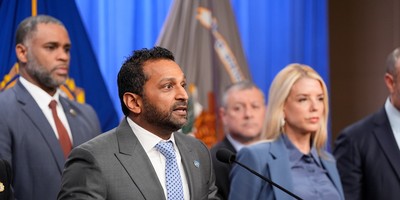LONDON -- Arguably the most famous living Englishman is, technically, not alive. But Harry Potter now determines the American conception of Britishness as thoroughly as Sherlock Holmes ever did. Rather than making the disappointing pilgrimage to Baker Street, a generation will visit King's Cross station asking for Platform 9 3/4 and expect to exchange dollars for Galleons at Gringotts. The mythic geography of England -- always as important as its actual hills and streets -- has been reshaped by J.K. Rowling.
Young Potter is invariably taken either too seriously or not seriously enough. Modern witch-hunters believe his spells and potions are an invitation to the occult -- forgetting the equally potent magic of Narnia or Middle Earth. Literary critics dismiss Rowling's writing as banal, her stories as derivative -- a rummage sale of mythological creatures and conventional themes.
Neither snobs nor fundamentalists have prevented the sale of 450 million Harry Potter books, which places the series in the best-selling company of "The Book of Mormon" and the "Quotations of Chairman Mao."
The books, in fact, are gloriously derivative, providing an introduction not to magic but to mythology. Harry's world is populated by centaurs, dragons, werewolves, grindylows, veela, Cornish pixies, sphinxes, phoenixes, goblins and hippogriffs. It is as though Egyptian, Greek and Roman mythology, European folklore and Arthurian legend suddenly discovered the same playground. "I'm one of the very few," Rowling has observed, "who has ever found a practical application for their classics degree."
The world's great stories -- of heroic journeys, of peril, testing and courage, of nature enchanted, of happy endings -- get reincarnated for a reason. Created to explain the world, myths eventually began to explain us and our pre-rational values and culture. When these strings are touched, we feel the vibrations deep down. And we know that myths are not the same as lies.
In his essay "On Fairy-Stories," J.R.R. Tolkien -- who knew something of the subject -- describes the highest achievement of the teller of stories as "sub-creation." The sub-creator fashions "a Secondary World which your mind can enter. Inside it, what he relates is 'true': it accords with the laws of that world." Tolkien calls this "a special skill, a kind of elvish craft." The creator of Harry Potter practices this craft well -- an achievement her detractors cannot understand or duplicate. To read Rowling is to pack a bag and make a visit.
Recommended
Tolkien describes the distinguishing climax of a fairy story as the "turn" -- the moment when fantastic and terrible adventures are transformed by sudden grace, "giving a fleeting glimpse of Joy, Joy beyond the walls of the world, poignant as grief." "A tale that in any measure succeeds in this point," he continues, "has not wholly failed, whatever flaws it may possess."
In the last of the series, "Harry Potter and the Deathly Hallows," and in the current movie based upon it, Rowling reaches the turn. A boy who has played Quidditch, discovered girls, broken curfew and cheated death again and again discovers that he was intended for death, "marked for slaughter," all along. A scarred hero -- his birth prophesied, his character tested by the temptation of dark power -- realizes he must sacrifice himself for the sake of his friends. The "chosen one," it turns out, was not chosen for honor but for extermination. Death, he finds, can only be defeated when it is embraced. Harry's destiny requires a "cold-blooded walk to his own destruction."
These are the ambitions of Rowling's brand of children's literature. Harry's walk toward the Forbidden Forest gains the reflected emotional power of the walk from Gethsemane to Golgotha. It is the recycling of the greatest myth -- a myth that some also regard as true. And the final delivery from death is the culmination of all happy endings.
Rowling seems to anticipate the objections of those who dismiss myths as lies. Harry's enemy, Voldemort, does the same. "That which Voldemort does not value," she writes, "he takes no trouble to comprehend. Of house-elves and children's tales, of love, loyalty and innocence, Voldemort knows and understands nothing. Nothing. That they all have a power beyond his own, a power beyond the reach of any magic, is a truth he has never grasped."
Rowling's children's tale -- like the best that came before it -- has a sliver, a glimpse, of that power, beyond the reach of magic.

























Join the conversation as a VIP Member